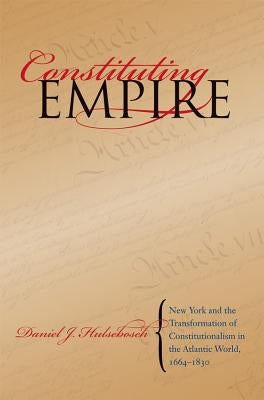University of North Carolina Press
Constituting Empire: New York and the Transformation of Constitutionalism in the Atlantic World, 1664-1830
Constituting Empire: New York and the Transformation of Constitutionalism in the Atlantic World, 1664-1830
Regular price
€42,95 EUR
Regular price
Sale price
€42,95 EUR
Unit price
per
Shipping calculated at checkout.
Couldn't load pickup availability
According to the traditional understanding of American constitutional law, the Revolution produced a new conception of the constitution as a set of restrictions on the power of the state rather than a mere description of governmental roles. Daniel J. Hulsebosch complicates this viewpoint by arguing that American ideas of constitutions were based on British ones and that, in New York, those ideas evolved over the long eighteenth century as New York moved from the periphery of the British Atlantic empire to the center of a new continental empire.
Hulsebosch explains how colonists and administrators reconfigured British legal sources to suit their needs in an expanding empire. In this story, familiar characters such as Alexander Hamilton and James Kent appear in a new light as among the nation's most important framers, and forgotten loyalists such as Superintendent of Indian Affairs Sir William Johnson and lawyer William Smith Jr. are rightly returned to places of prominence.
In his paradigm-shifting analysis, Hulsebosch captures the essential paradox at the heart of American constitutional history: the Revolution, which brought political independence and substituted the people for the British crown as the source of legitimate authority, also led to the establishment of a newly powerful constitution and a new postcolonial genre of constitutional law that would have been the envy of the British imperial agents who had struggled to govern the colonies before the Revolution.
In his paradigm-shifting analysis, Daniel J. Hulsebosch captures the essential paradox at the heart of American constitutional history: the Revolution, which brought political independence and substituted the people for the British crown as the source of legitimate authority, also led to the establishment of newly powerful constitutions and a new postcolonial genre of constitutional law that would have been the envy of the British imperial agents who had struggled to govern the colonies before the Revolution.
The revolutionary transformation did not, therefore, consist of a new conception of the constitution as a set of restrictions on the power of the state, Hulsebosch argues. Instead, it entailed a search for new ways of framing, empowering, and limiting official power. Drawing on new archival sources as well as canonical documents such as The Federalist Papers, Hulsebosch demonstrates that these constitutional experiments were informed by imperial experience and continued well into the nineteenth century, as New York moved from the periphery of the British Atlantic empire to the center of a new continental empire.
Author: Daniel J. Hulsebosch
Publisher: University of North Carolina Press
Published: 10/01/2008
Pages: 496
Binding Type: Paperback
Weight: 1.55lbs
Size: 8.90h x 5.90w x 1.20d
ISBN: 9780807859209
Hulsebosch explains how colonists and administrators reconfigured British legal sources to suit their needs in an expanding empire. In this story, familiar characters such as Alexander Hamilton and James Kent appear in a new light as among the nation's most important framers, and forgotten loyalists such as Superintendent of Indian Affairs Sir William Johnson and lawyer William Smith Jr. are rightly returned to places of prominence.
In his paradigm-shifting analysis, Hulsebosch captures the essential paradox at the heart of American constitutional history: the Revolution, which brought political independence and substituted the people for the British crown as the source of legitimate authority, also led to the establishment of a newly powerful constitution and a new postcolonial genre of constitutional law that would have been the envy of the British imperial agents who had struggled to govern the colonies before the Revolution.
In his paradigm-shifting analysis, Daniel J. Hulsebosch captures the essential paradox at the heart of American constitutional history: the Revolution, which brought political independence and substituted the people for the British crown as the source of legitimate authority, also led to the establishment of newly powerful constitutions and a new postcolonial genre of constitutional law that would have been the envy of the British imperial agents who had struggled to govern the colonies before the Revolution.
The revolutionary transformation did not, therefore, consist of a new conception of the constitution as a set of restrictions on the power of the state, Hulsebosch argues. Instead, it entailed a search for new ways of framing, empowering, and limiting official power. Drawing on new archival sources as well as canonical documents such as The Federalist Papers, Hulsebosch demonstrates that these constitutional experiments were informed by imperial experience and continued well into the nineteenth century, as New York moved from the periphery of the British Atlantic empire to the center of a new continental empire.
Author: Daniel J. Hulsebosch
Publisher: University of North Carolina Press
Published: 10/01/2008
Pages: 496
Binding Type: Paperback
Weight: 1.55lbs
Size: 8.90h x 5.90w x 1.20d
ISBN: 9780807859209
About the Author
Hulsebosch, Daniel J.: - Daniel J. Hulsebosch is professor of law and history at New York University School of Law.


